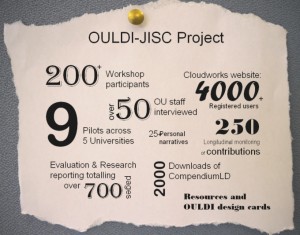Over the last month, we’ve been working on finishing our final Evaluation and Project reports. In pulling together research and experience from all five project strands and nine pilots we’ve been able to collate findings and think about what we have achieved, what we have discovered and what this means.
The focus of the OULDI project has been on developing and piloting tools, resources and approaches that support institutional curriculum design processes and design practice/cultures. The Evaluation Report (PDF 91pp) reviews each of these in turn, including tools for sharing learning design expertise (Cloudworks), for visualising designs (CompendiumLD, Module Map, Activity Profile) and for supporting design and reflection in workshops (Course Features Facilitation Cards, Information Literacies Cards, workshop activities, etc.). The Report evaluates how effective these have been and what this tells us. For example: how do communities of practice use a shared design space? How well do university processes map actual practice? What benefits and barriers can we discern? What discourses of resistance and case studies of personal success have we recorded?
One clear message is that it is possible to be successful in changing or improving the process, practice and perception of curriculum design but has found this requires a combination of elements working together: selection of effective design tools; well configured institutional and informal design processes; proper opportunity for collaboration; reflexive working and dedicated time away from the day-to-day to work on a design; positive and real management endorsement; staff with positive attitudes and adequate tacit knowledges of the art of teaching and the discipline of designing learning; and an expert consultant role to guide and advise teams. The success of embedding learning design is therefore dependent both on the internal quality of the particular design approach or tool and on the capability of the (institutional/professional skills) context to ‘receive’ it
Building on the Evaluation Report, the final Project Report (PDF, 21pp) presents a concise project summary offering an overview of the educational, learning design and technical context and documenting the benefits seen to the design process, design communities, design practices, design software and visualisation and the sector. The Project Report concludes with some ‘lessons to share.’

[…] […]